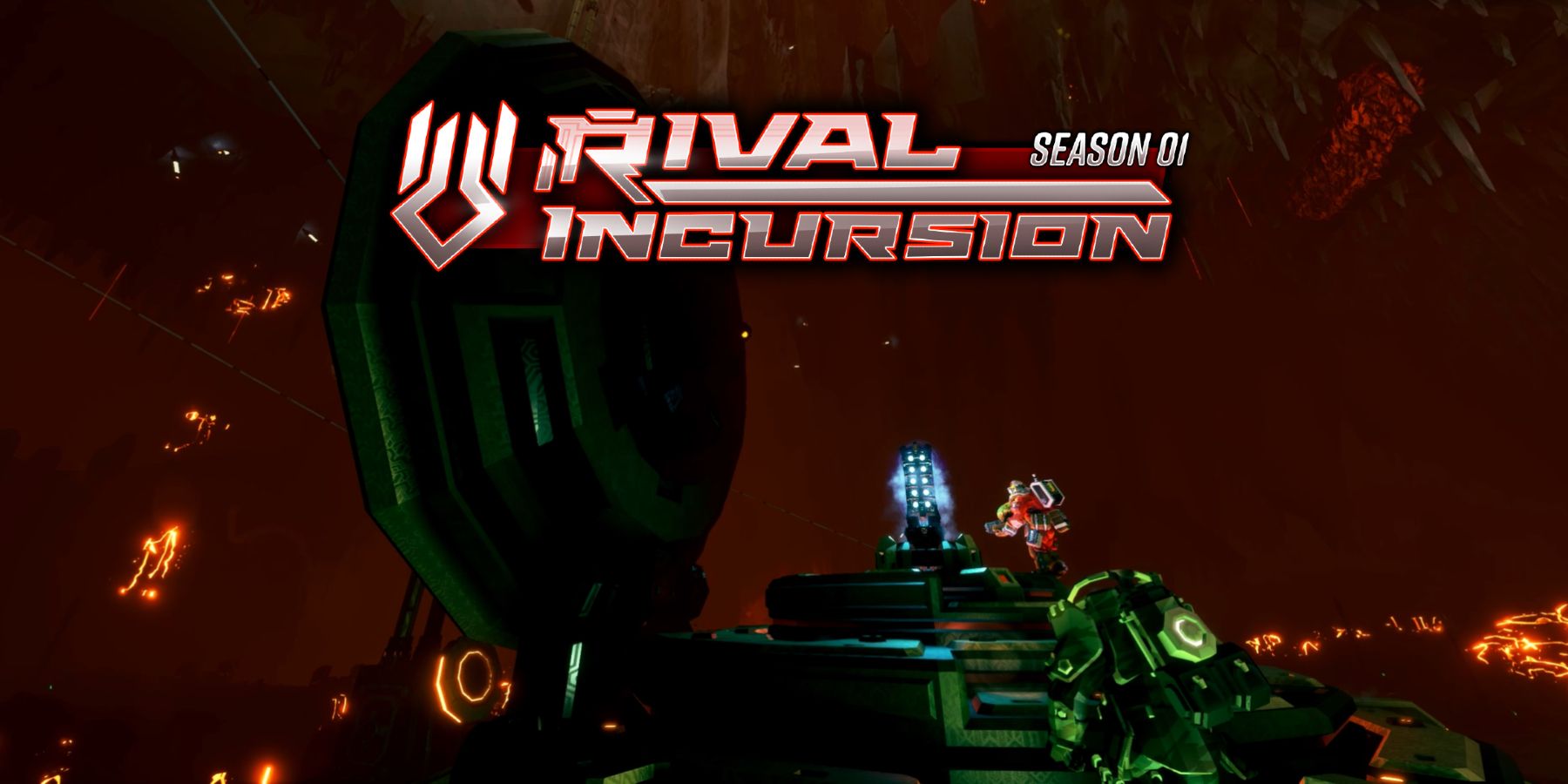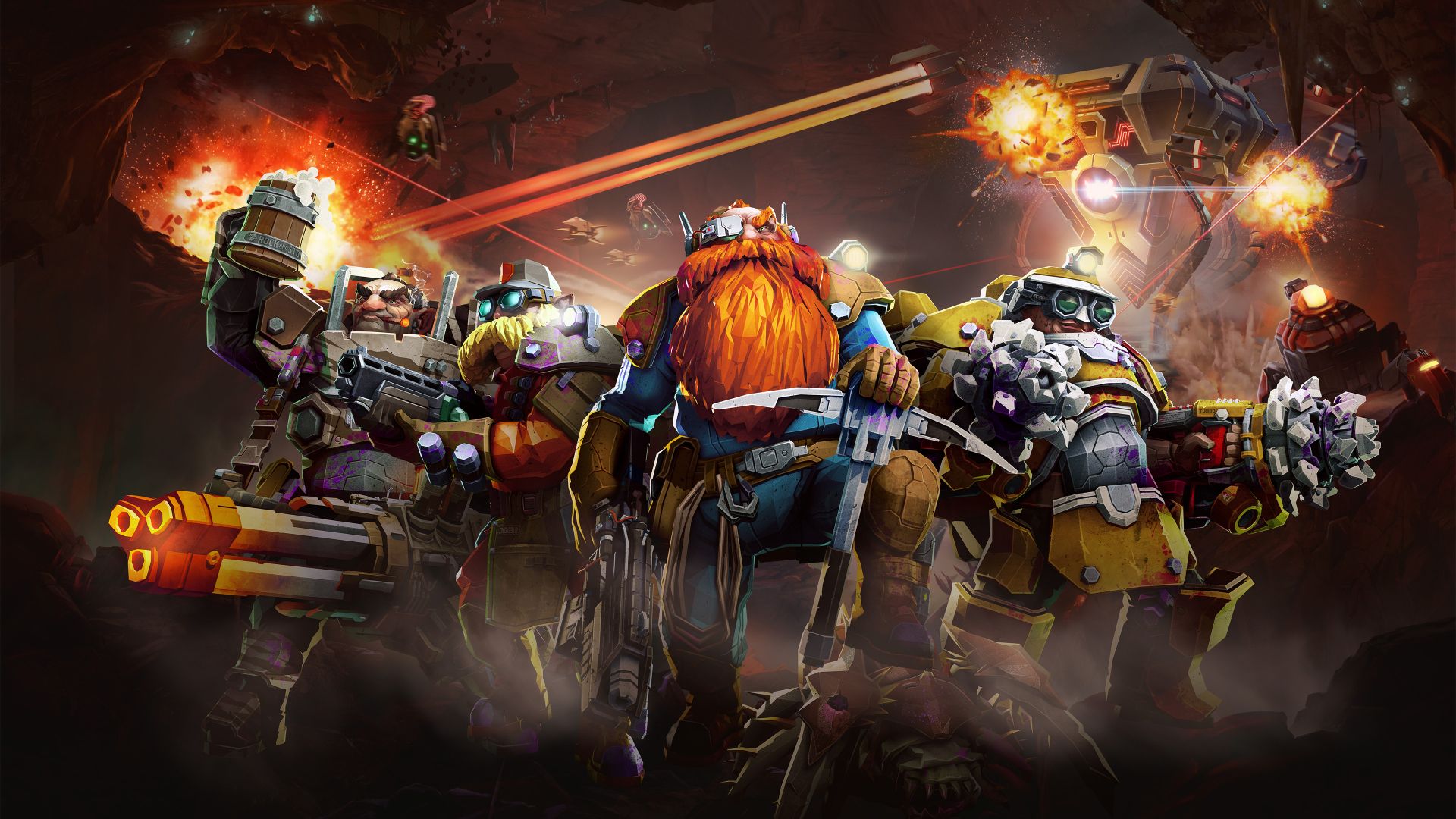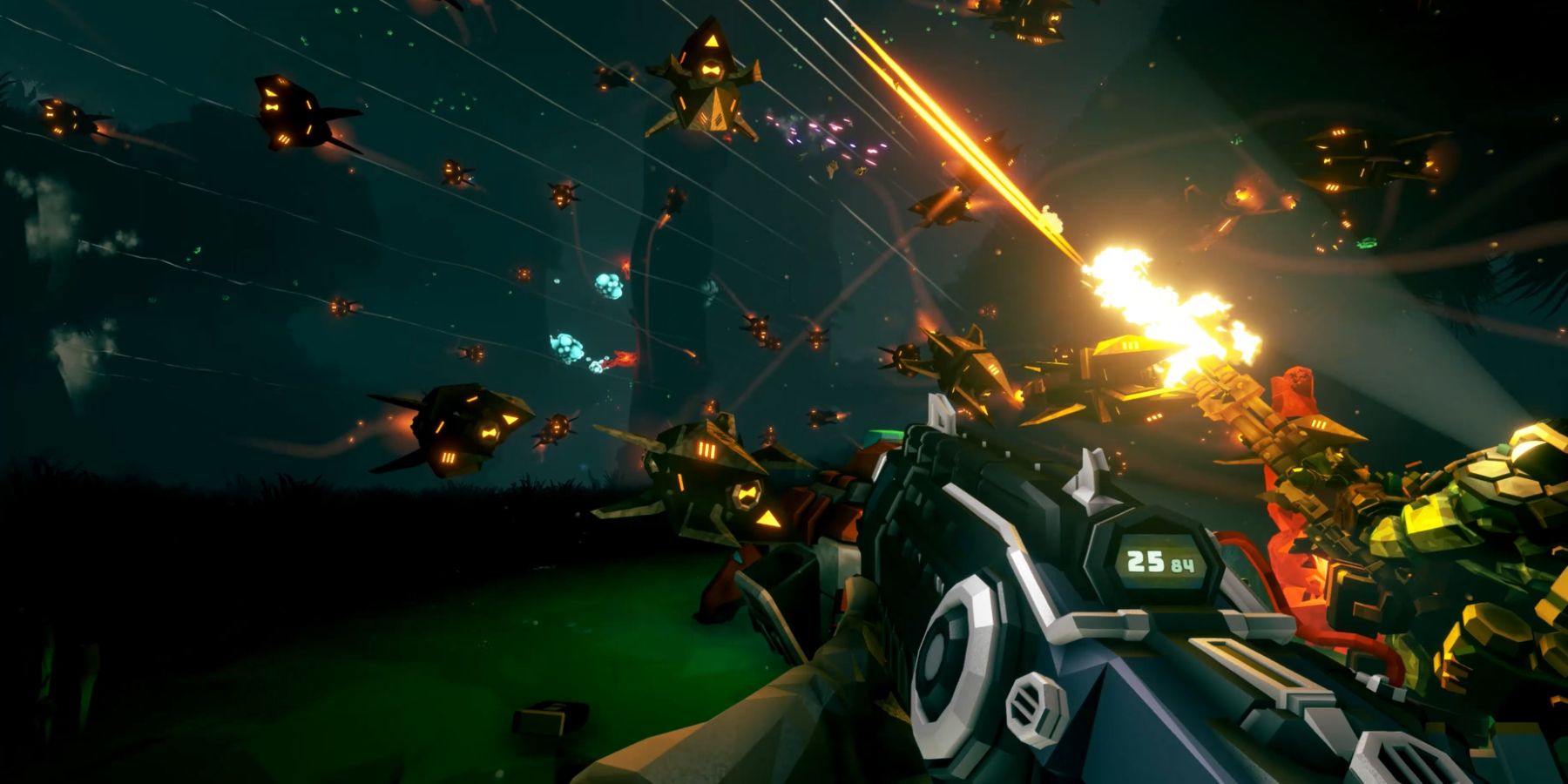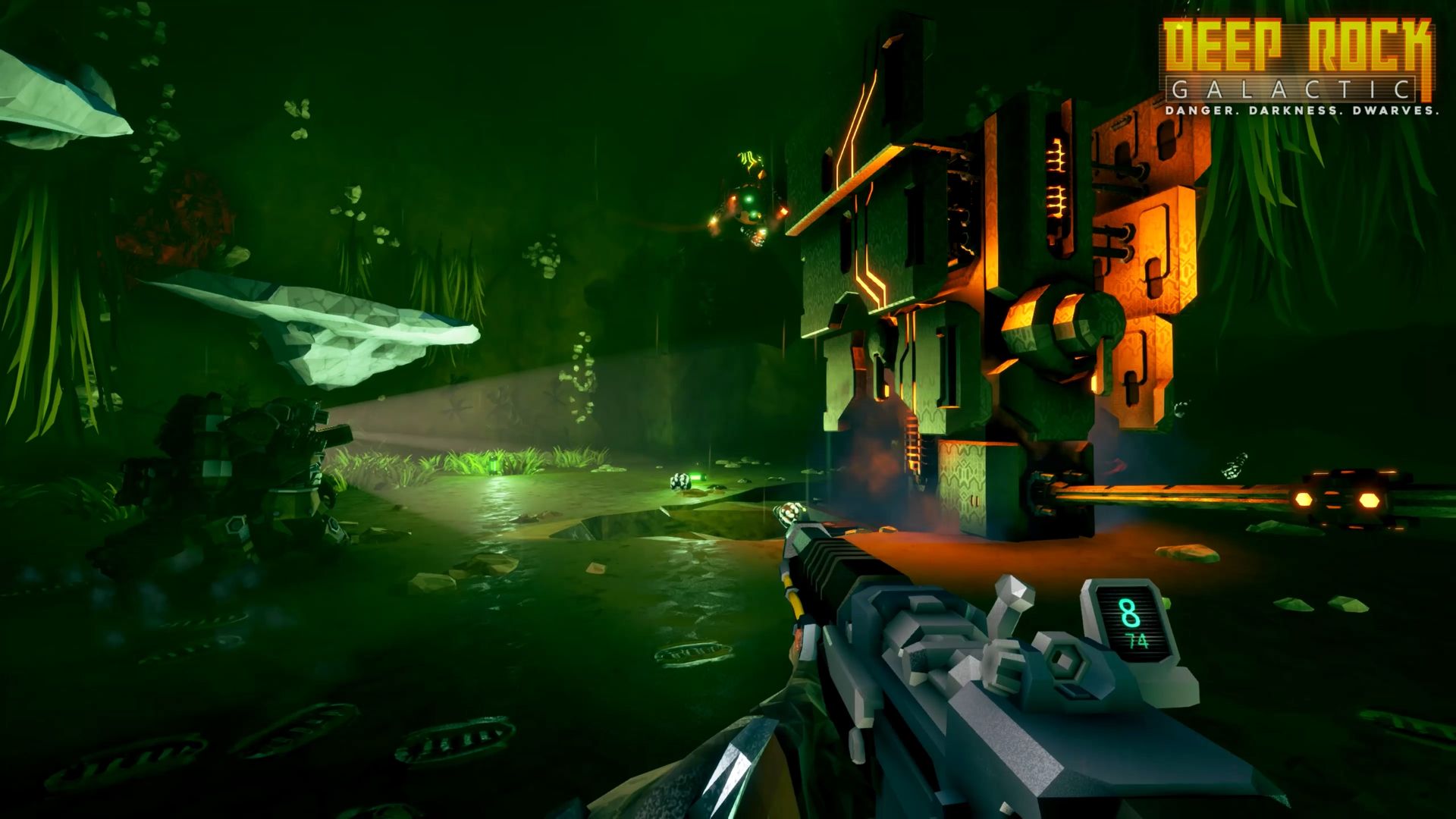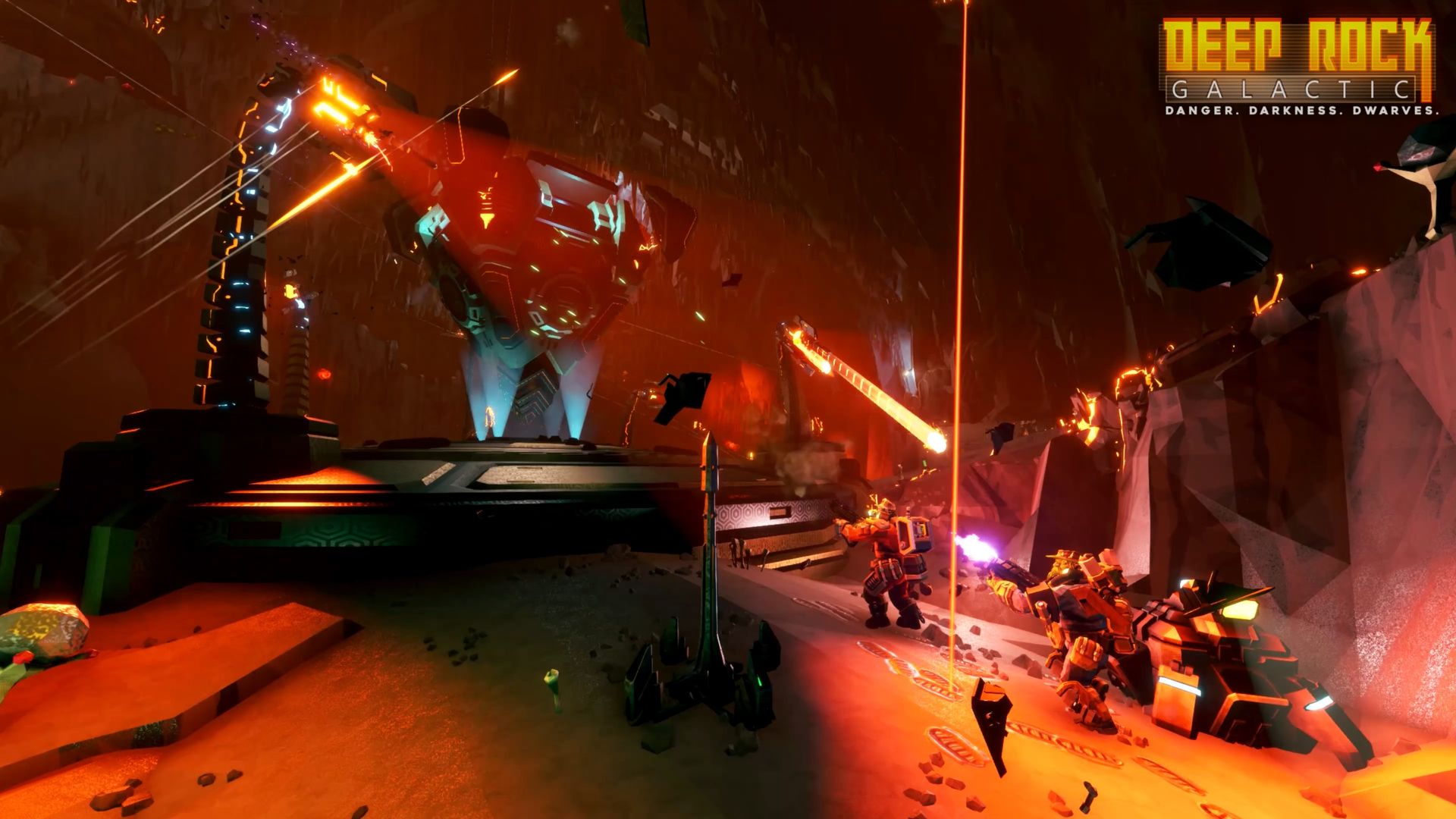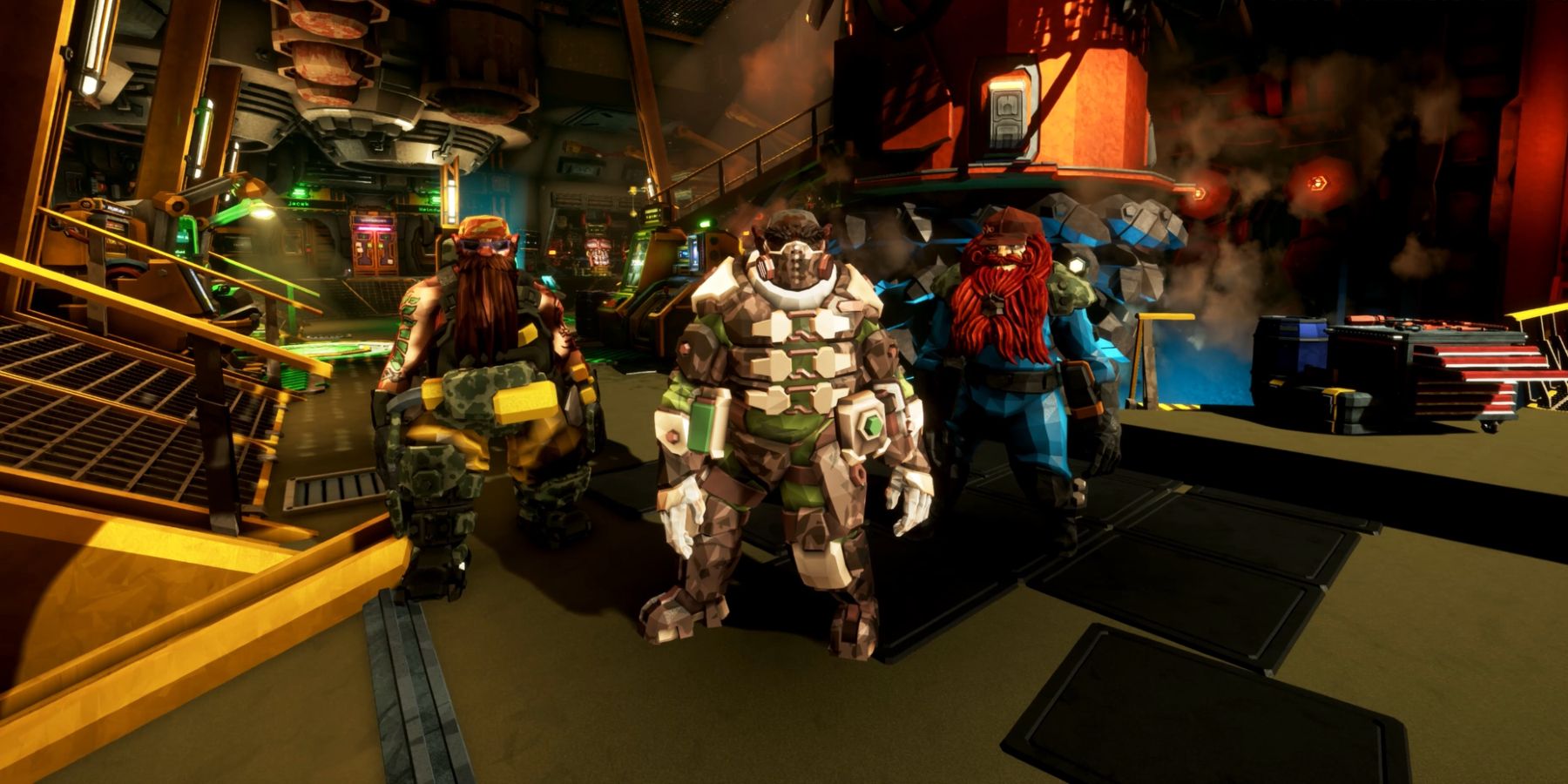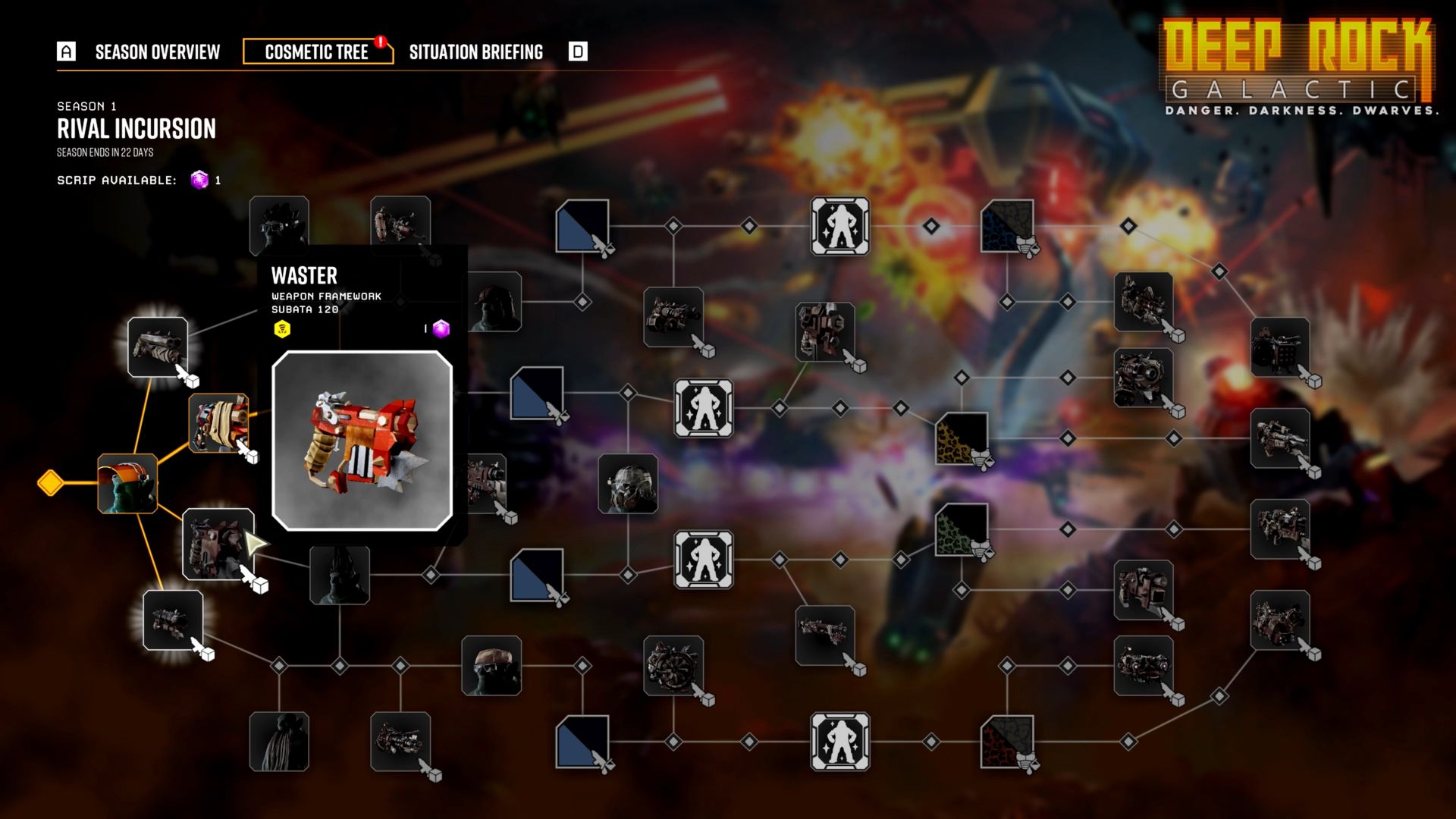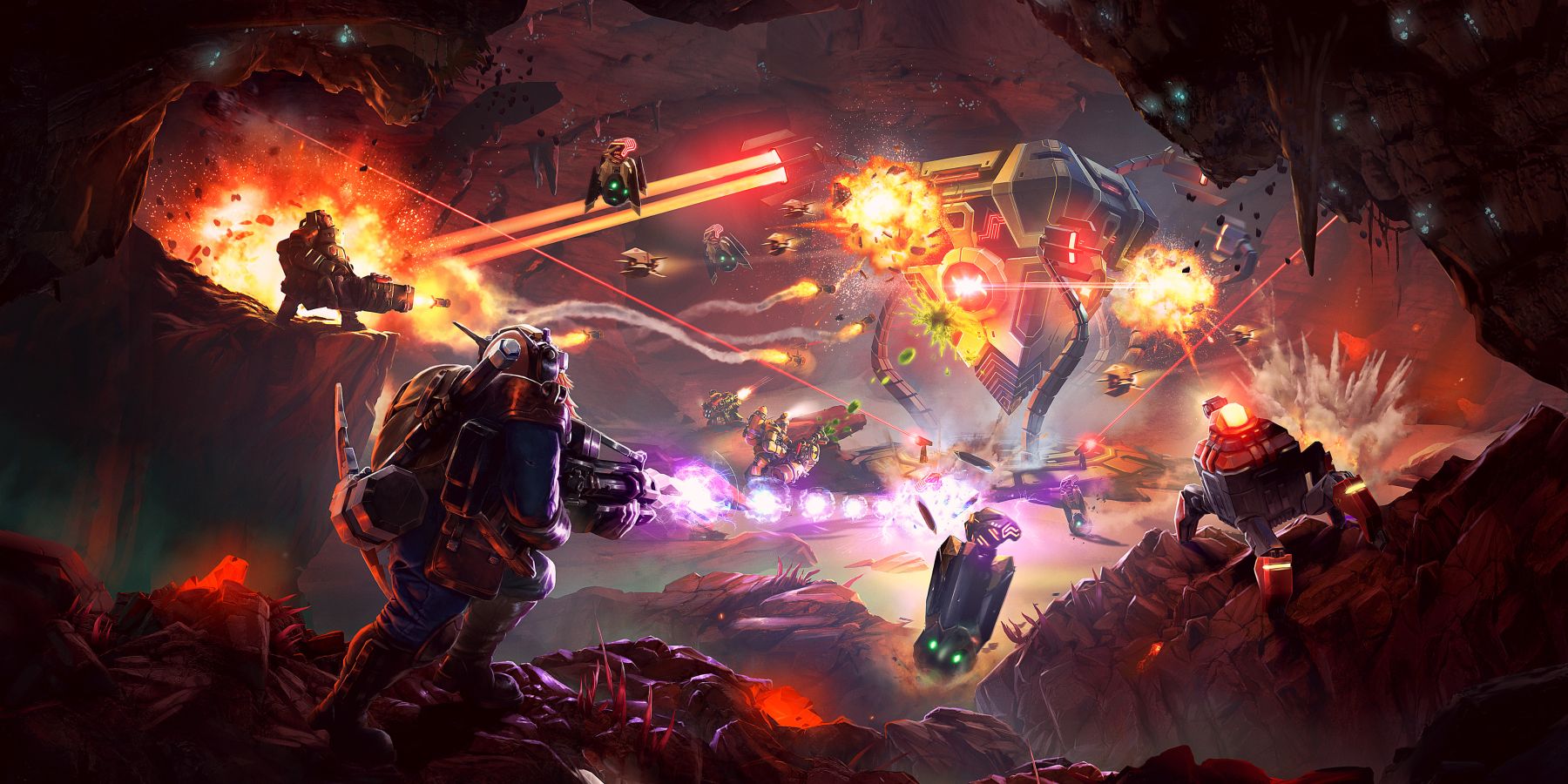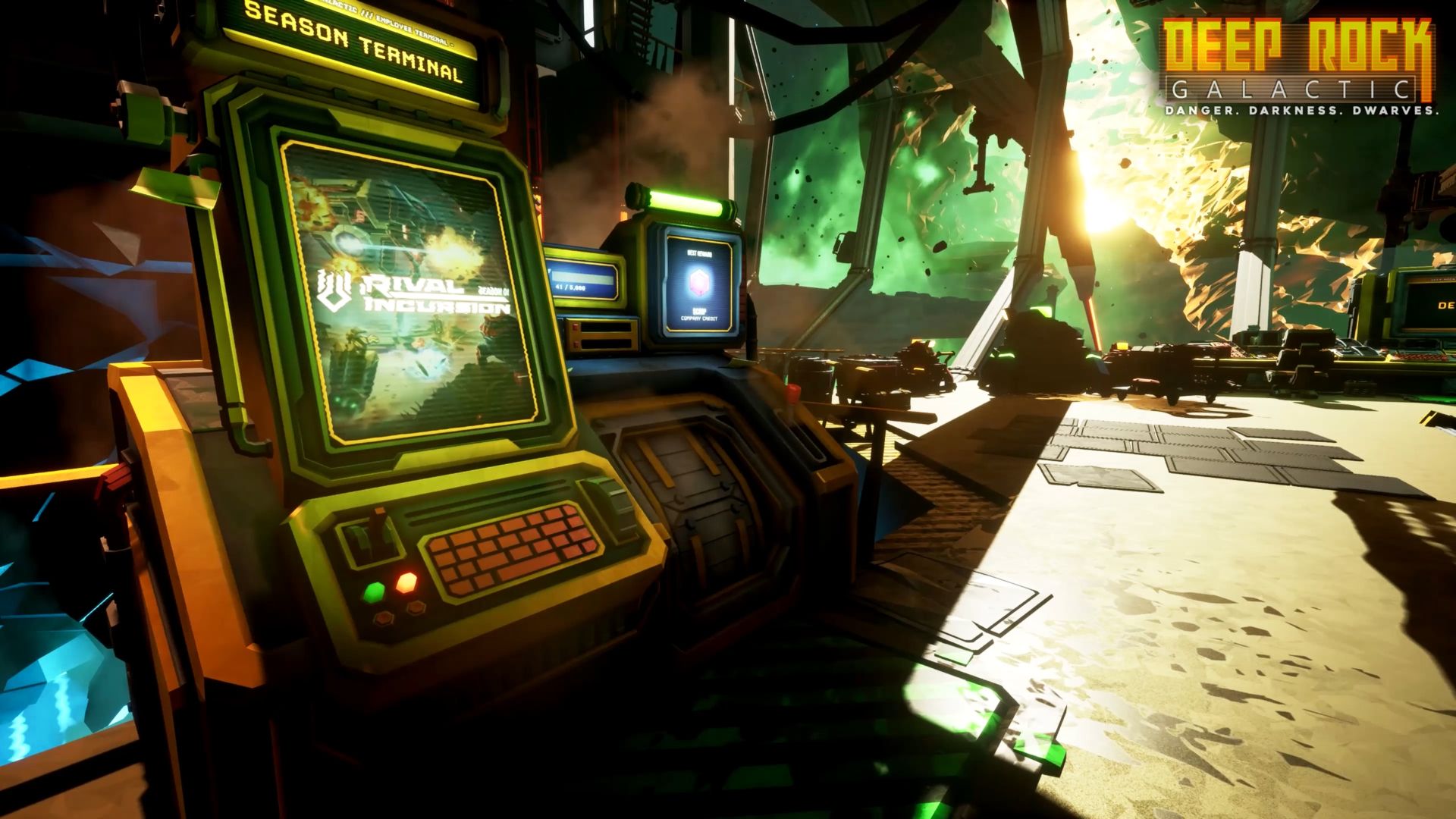Co-op games have become that much more important in an age where the ongoing COVID-19 pandemic is keeping family and friends apart. Deep Rock Galactic has offered its fans a cooperative experience since 2016, one with increasingly more alien environments for groups to dive into so they can collect rare minerals, squash giant insects, and spout catchphrases like the ever-popular "rock and stone."
Game Rant spoke to Ghost Ship Games' game director Mikkel Martin Pedersen about Deep Rock Galactic hitting three million sales and the launch of its seasonal battle pass system in November. Interview has been edited for clarity and brevity.
Q: How did you get into game design?
A: I was, for many years, trying to become a film editor and get into The Danish Film School. The last time I got pretty far talking about stories in computer games because they were one of my big addictions at that time, but I didn't get in so I said, "Maybe this is wrong, maybe I should look into computer games instead."
I was studying film at a university in Copenhagen and was fortunate enough to get an internship at one of the few Danish companies at the time called Deadline Games. Very quickly I was there a year, and I was hired and promoted to game director for a small title called Globetrotter 2. Then Deadline Games transformed and wanted to do console titles so we started working on Total Overdose. I worked on that title with Soren Lundgaard - the CEO at Ghost Ship right now. He was lead programmer on Total Overdose.
Lundgaard and I have been working together in different ways for a while, sometimes he's under me as game director, I'm under him as CEO now. That's how I got in the business, and I never finished my college degree because I just got hired and it was super hard to get a job in the games industry back then. I'm sure that's still the case. People want experience, so whatever they can get is a big plus.
I worked at Deadline Games for 10 years before they went down with the big crash in 2007 or so. From there I had various jobs in different game companies. The last one was Press Play, a Microsoft-owned studio where I worked on Max: The Curse of Brotherhood. When Microsoft decided to close that studio, some of us working there together said now is the time, we should start our own company.
The idea for Deep Rock Galactic came from our lead programmer Jonas Moller who had been exploring caves in Minecraft and said, "If only we had big guns, this could be really awesome." He was also a huge fan of Left 4 Dead, so that was the pitch: Left 4 Dead meets procedurally generated caves in Minecraft. Then we added Dwarves, and had a core concept. It was easy to understand and get behind.
We founded Ghost Ship Games a little more than five years ago, and what a ride it's been since then.
Q: What other kinds of games influenced you? In life, or on Deep Rock specifically.
A: I think that's difficult to say, because as a game designer I've been working on very different kinds of games with different target audiences. I really like to play a broad variety of games, so for example when I was working on Total Overdose, a third-person shooter taking cues from Max Payne, I was very much inspired by Virtua Tennis. Stuff like that might not be an obvious inspiration for a mechanic, but you can pull from anything. I try to have that broad perspective.
Deep Rock Galactic is the first co-op game I've ever done. It's like I'm trying to tick off boxes, work on as many different kinds of computer games as possible. Part of the fun is diving into a genre and finding out its ins and outs. I'd say if you're coming into a genre as an outsider, that can offer a fresh look at things.
Jonas was playing a lot of Left 4 Dead, but I had only played it briefly. I remember the first time I did it with him was a sh*tty co-op experience. He was super good and I was really bad, so I was like a brick around his leg. When we started working on Deep Rock Galactic, one of the things that was very important to me was that new players should be able to join experienced players, and the experienced ones feel like they're adding value.
That's how we developed the class system and traversal tools that you need to work together to take advantage of. If you're missing one class, you always feel like you're missing out on some mechanics.
Q: This year has been great for co-op games with Back 4 Blood, It Takes Two, etc. As someone working on one, have you noticed any trends in the industry?
A: When we started on Deep Rock Galactic we tried to do our own analysis of the co-op field, and what we saw was if you liked co-op games such as Left 4 Dead or Team Fortress there's a good chance you played all of them. That's different than, say, a League of Legends player who might not play anything but League. Same for Counter-Strike, Fortnite... Those games can take all your time and focus. That makes co-op games interesting because we're not really fighting for users, we're just sharing them.
The other thing we saw five years ago is there weren't many pure co-op games. There were a lot of big shooters like Call of Duty with some co-op modes, but they were not co-op first like Left 4 Dead or Vermintide. We saw that we could make a game that would fit a corner of the market.
But again, working on Deep Rock Galactic and creating Ghost Ship Games has been pure fun. We're making the game we'd like to play ourselves. It sounds crazy, but that's how it is, we didn't think too much about the end user when we started this project. We're gamers and hoped that if we made something we loved, others would love it too.
As Deep Rock Galactic has grown and we started our open development, being transparent about what we're working on, we began communicating with our users and became influenced by them.
Q: How different has it been working on something you started versus a company like Press Play, more of a AAA Xbox studio?
A: We have six founders, and most of us have held lead positions or were middle managers at other studios. We've been sitting close to management, but never calling the shots. I think that's been really fun after sitting for all those years thinking, "Oh I would do this." Also taking all our knowledge and experience into our own company.
When we started out we had an idea for Deep Rock Galactic, but we also wanted to build a company. I think that's different from a lot of indie start-ups where the focus is just building a computer game. We were very much aware that we wanted to make a studio with people we love to work with, a specific culture that has principles. For example, we hate crunch, we don't want to do it.
Q: Coffee Stain came on as a publisher at some point, did that help launch the game?
A: Yeah, when we started out we were just six guys, and the question was how the hell we were going to raise money for this. I'm 48 and the rest of the guys aren't young anymore, so we have wives, kids, houses. We needed money, we couldn't just do this in a shoebox.
We started out getting government funding, and that enabled us to get even more money. We weren't sure if we wanted to have a publisher, but then we met with Coffee Stain and it immediately clicked. They're five, 10 years younger than us, but had the same ideas about how they wanted to run a game studio. They understood game development, and it made us very confident in working with them. So they invested in the company and became our publisher.
Q: Tell me about the decision to do open development like you were saying.
A: We knew we wanted to do what I refer to as "open development," basically us talking about the game and what we're doing. I remember six months after we founded the company we started sharing screenshots and videos from our prototype. It was looking sh*tty, but our philosophy was that if we released it now, the next upload would look way better. After we did the first one that was super scary, it's been improving and we're really proud of what we've been sharing.
That's something I can totally recommend. If you have a game you can be open about, do it as soon as possible. I'm really tired of this secrecy from other game studios or publishers, things like embargoes — not to say we aren't also using embargoes, but being transparent as a game developer is really satisfying. That way you aren't just working on a game for five years and not able to tell anyone what you're doing. That's not so fun.
Q: What was the initial reaction to Deep Rock Galactic when you put it out there?
A: Early on we decided to not try and go for a "splash." That's normally what you try to do when you're closed off about the game you're making, try to line up a release and information building up to it. We said no, we'll do things differently. We started hoping to get 10 people to sign up for our newsletter, and then we'd celebrate when we hit 20, then 40. Ride that curve as far as we can, celebrating all the way.
That's been a satisfying way to do it, because it means we have been increasing our matrix constantly over five years of production. It's very motivating for us founders, but also the rest of the team. It's more fun to work on something that's a success, we've basically been celebrating the last five years.
Q: Fast-forward, now the game is at three million players.
A: Yeah, that's crazy.
Q: Were there any periods you saw huge increases in popularity? Big updates, anything like that?
A: In the history of Deep Rock Galactic there have been numerous events pushing us. Early on we made a deal with Microsoft to have it in Xbox Game Preview, and we made a trailer that aired at E3. Before that we just tried to increase our matrix, get people signed onto our newsletter, join our closed Alpha. We'd been doing that ourselves without any promotion.
When that trailer showed at E3, it gave us a huge bump. That was super important for getting people aware of what we were doing with Deep Rock Galactic.
Then the next one was our Early Access launch. Today you see Early Access launches that are crazy good, for example Valheim, games that skyrocket insanely high. But ours was solid enough that we could see we had a success from day one.
After that we worked on a lot of updates until the 1.0 launch, which was another peak. Then recently we had the Season 1 update, and that moved a lot. Basically we broke our previous concurrent users record, which I think was 35,000 during a free weekend. Now we hit 41,000 or so. To do that without a free weekend made us really happy, none of us guessed it would go so crazy. It's insanely satisfying.
Q: I was about to ask how it felt having started with just six people and seeing Deep Rock become what it is now.
A: It's crazy.
The thing is, when we launched the game into Early Access we had no idea if it would become a success. We had about 12 people when we launched, everyone on contracts because we didn't know if we'd have money the next month.
Another thing that's super difficult to know is what kind of community you're getting. We've been so happy about the community we have, because I don't know how many other games are out there where you can just jump in, play with strangers, and have a great experience. I think our game is mostly like that, it's rare you have a bad experience. I don't know how we made that, it's pure magic.
Q: With regards to that community, have any big changes been based on what the community asks for? How much of an influence have they had?
A: We're reading Reddit, Steam forums, Discord — we have a huge Discord community as well. They help us a lot, for example we have a select few people doing early testing and feedback. Ghost Ship only has about 20 people with the game in our hands, so having time to test and evaluate the quality of Deep Rock can be difficult. We get used to playing things like our new mission type, Industrial Sabotage, since we're constantly tweaking it and testing its flow.
Community requested changes we've done constantly. For example, this is a small anecdote that was all on me: I don't remember which update it was, but at the last minute I felt it looked so lame to pick up a Boolo Cap or Apoca Bloom because there was no animation. There was another system with an animation that looked like a hand swiping across the screen, so I set that up to happen when you pick up items. This was about five days before we released the update.
All was good, but then chaos broke out. What I hadn't foreseen is people had to stop when they were doing this, which broke the flow of play. We got a lot of feedback, but the feature was already in so we couldn't just pull it. We improved it, made a system where a proper animation could pick up the item. It looks way better and you can do it during movement.
Another example of how we use the community is by sending out polls to ask what features they want to see most. New classes has been one of them, but I'm pretty confident saying that's not going to happen. The second is new weapons, and that's something we did deliver with the Season 1 update offering new primaries for every class. We're also going to do secondary weapons in the future.
Q: So you're focused on buffing out current classes over adding new ones?
A: I wouldn't even say "buffing out." The way we're developing classes is letting people take them in multiple directions. You can create subclasses within a class, one might say. Builds could be more supportive, damage dealing, etc.
Q: Deep Rock has been the co-op game for my friend group for a while. One of my friends wanted to know if there are plans for something like a PvP option, which we briefly touched on.
A: Nope. That's not going to happen.
I can never say never, but as of right now it's never going to happen. We have small party games on the space rig that are like PvP, but we don't want to do PvP. One of the main reasons is we want the game experience to be friendly, non-toxic, non-aggressive. That tends to come with PvP.
We have nothing against PvP games, we play them ourselves. But with Deep Rock it's a PvE game.
Q: Earlier you said there's only about 20 people at Ghost Ship?
A: I think we're about 28 at the studio right now, and we have a few that are in roles like office manager, test department, platform engineers, community manager. They're part of the team of course, but if you look at pure development we're no more than 20 people.
Q: What is it like dividing work for current balance changes versus work on new content like seasons?
A: We don't plan very far ahead. One of the reasons we don't is because this open development feels more honest. We just released Season 1 on Xbox, which means we've been hot patching the update, and I'm pretty confident we're about to end that. So during this period we start to look at what we want to work on next, gauge feedback. Its been like that for all the updates, basically.
Of course we have some ideas, like we knew that a year or two ago we wanted to add more weapons. But we didn't have plans for when that was going to happen. We also wanted to do more mission types and biomes. What we do next is most decided after each update, though.
What we're doing now with Season 1 is trying to formalize what our updates are. As game director, I felt like the idea of saying "Update 35" became a little unsexy. I prefer this way around where we're calling it seasons, tying elements together under more specific headlines. We have a new Performance Pass, our take on a battle pass that's all free. Then, of course, we need some content for flavor each season, as well as all the quality-of-life features and new ideas we want to try. It gives us a nice framework.
Let's talk a little about the seasons and why we started doing them. One thing we saw with previous updates is that we have a huge community with people playing Deep Rock a lot. Because of that we felt like it was easy for people to go straight into the content and leave again. With the Performance Pass, we're giving people who have sunk in more than 500 hours a think to work toward. We can see that in our concurrent numbers, they're way higher than before.
I'm playing Deep Rock Galactic myself, I have my live save where I've been sinking in a lot of hours after Season 1 launched. That's also important because it gives me a good feeling how the Performance Pass works. You can do all the math behind it, but it's different to actually work toward it yourself.
Q: Though Deep Rock encourages trying all the classes, do you have a favorite build?
A: We aren't the best gamers, not even playing Deep Rock Galactic. Some people in our community are way, way better than us. You need to bring your A-game when testing high-level content, in which case I'm always Gunner.
Q: How do you balance the addition of something big like the Performance Pass which adds more for veteran players without overwhelming newcomers?
A: Actually, adding seasons and things like the Performance Pass is a way for us to give stuff to new players. We have the new primary weapon licenses that are unlocked later in the game, but you're interacting with the Performance Pass immediately. That's something new players are going to benefit from, and that makes me really happy.
Q: Since battle passes are huge across the industry, were there any examples you looked at to pull or improve certain features?
A: I designed the battle pass, and when I started I was looking at all the others that felt relevant for us. Sea of Thieves introduced the Plunder Pass, and that's a co-op game. I also looked at Fall Guys, Magic: The Gathering Arena — I'm an avid Magic player, by the way. Then I did some research, looked at comments about battle passes.
The fact we aren't monetizing ours I think makes it clear we're doing it for fun. We're trying to take the positive things a battle pass can add into a game like Deep Rock Galactic. There are a lot of positive things, motivating people to play and so on. In Deep Rock we already had a similar kind of progression, upgrading your characters and then your weapons. What we've been missing is a longer-term thing to work at, and the battle pass formula works extremely well for us.
Going back to what I said at the beginning, we want newer players to work with experienced players and all have a great time. We're not separating gameplay, we're not gating it in any way. That's important for us, not splitting our community.
Q: From what I understand, the idea is that Performance Pass content will be available after each season in some capacity, right?
A: We are planning for that now. There's no final decision yet, but right now we're thinking after a new season pass comes out the current one won't exist anymore. All the cosmetics will just carry forward into the game, available through Cargo Crates, Lost Packs, Matrix Cores, or even in the store. That's one solution we're looking at now, but maybe there will be some twists. We don't know yet.
Q: What has the reception been like to the battle pass as it stands?
A: I think it has been really good. There's a lot of debate about battle passes and monetization that had us worried, but it seems like it has been received well.
One thing I'm really happy about is the cosmetic tree. The reason we did it is to give players some agency in the cosmetics they unlock. Some dedicate themselves to one class, so they can prioritize getting cosmetics for their main. We've estimated it should take around 100 hours to complete each season of the Performance Pass, but getting some of the good stuff in the cosmetic tree might only take 20 hours.
Q: Another big push for your season system is narrative. I know you said you don't plan far ahead, but is the idea to build an overarching story or have each season stand alone?
A: Can I answer yes to both? The way I see a season is it introduces something that is expanding the universe. That can either be building on an existing world narrative like with Rival Incursion, or it can be something completely different.
One thing we have is the way the Performance Pass ties into playing normal missions through world events to get things like Data Cells which give you Scrip, which can then be used on the cosmetic tree. I think we'll be looking into more stuff like that, things you encounter during missions that tie into the Performance Pass. It gives a new spice to the game that might change over time.
Q: How much are you guys looking to expand the Deep Rock universe?
A: I don't know. The craziest thing is we've somehow managed to come up with a core idea that feels like a bottomless pit, we have endless ideas for it. It's so easy to expand the game, to come up with new features. In that regard we aren't running out of things to do anytime soon.
Q: Another question from a friends is whether your team has seen fan-made ideas for, say, weapons that seem interesting enough to implement, or might miss the mark for some reason.
A: We have a lead designer sitting with the weapons, so I've been a part of the process but I'm not aware if he has actually engaged with anyone in the community to take ideas. But that's part of the beauty of this open development, we encourage all devs at Ghost Ship Games to talk with the community about whatever they do.
I know when we're doing weapons we have some themes on each class that ideas need to fit. For example, the Engineer has technical stuff like the Smart Rifle, and the Driller has environmental aspects with flames or the new Corrosive Sludge Pump. They also have specific roles they're fulfilling in combat, and we need to work with that. If you take the Driller, they have heavy secondaries compared to the Gunner with heavy primaries. We have to take that into consideration when laying out new weapons.
Q: There's already been nerfs after Season 1. What is that process like? What kind of issues have you noticed with the new weapons?
A: It's always like this. There's a balance that's super sensitive and we aren't always getting it right. But we can only take the weapon as far as we can with our closed test community after designers get the first line of testing. Only when we release the game can we see how they're performing.
We can see how powerful the weapons are, but that's only one thing. There's also public perception, and we listen to community feedback. It's complicated because there are different skill levels between players and guns. The Smart Rifle we introduced is probably the gun with the highest skill level to use effectively. Comments have said there's not enough ammunition, but you need to learn how to curve shots, lock onto targets. It's pretty advanced if you want to use it well.
Then there's different difficulties, various hazard levels. It's really time-consuming to test on all these hazard levels, which is why we need a period after we release the guns for balance. Plus, a lot of new content can be buggy or not work as intended, but once we fix it the balance of the gun shifts. When we push these things in patch notes people might say, "Stop nerfing those guns," but we need to do it because fixing one thing results in it being too powerful.
It's because people care, right? They get attached to a gun and how it plays, then we change that. Somehow I'm just happy people care that much.
Q: I understand you've done teaching and guest lecturing.
A: Not as much as I've done before, but yes. It still happens.
Q: Can you tell me a little about that? Whether it's giving back or however you might see it.
A: At Ghost Ship Games we've been so fortunate. We're situated in Copenhagen, Denmark, and giving back to the Danish game development industry is something we really want to do. We're in a unique position because of how open we are about what we do, sharing most of our numbers. We've been up-and-coming, I've been to GDC and know which talks were the most relevant to me doing a start-up company.
It's not always best just getting sugarcoated stories about what went right or wrong. A huge part of what we've been doing is trying to understand how Steam works since it's our main platform. Understanding how numbers work, how marketing works there, is super complicated and takes a lot of time for us. Seeing numbers from other developers can help us understand what we should or shouldn't do.
Denmark is also a small country right next to Sweden, which is way bigger for game development. So for us, helping to grow start-ups in Denmark is something we really want to do.
[END]
Deep Rock Galactic is available now on PC, Xbox One, and Xbox Series X/S. It will launch on PS4 and PS5 in January 2022.

